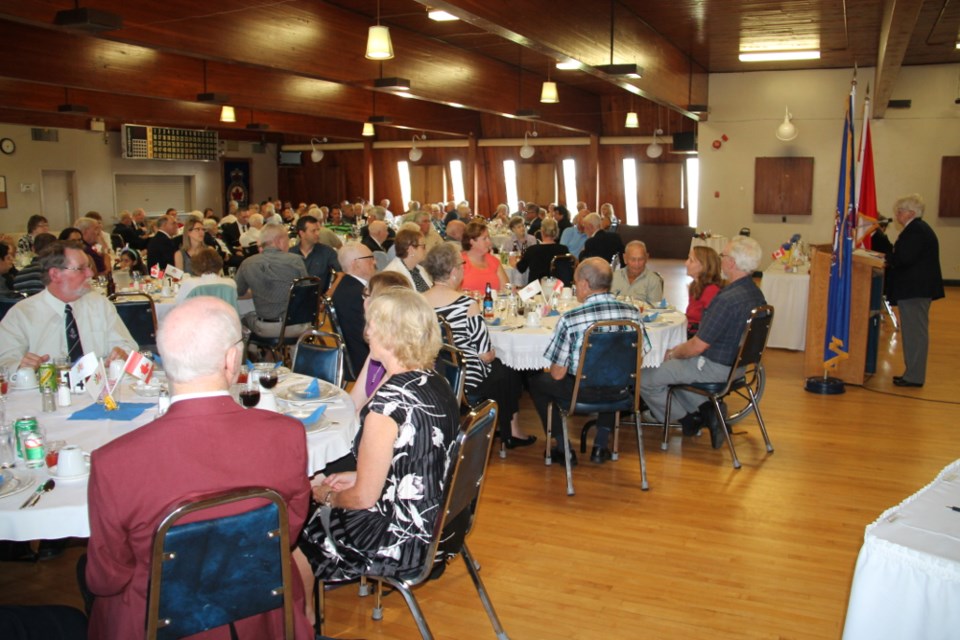In a touching tribute, and after much planning and hard work, Royal Canadian Legion Branch 25 officials held a banquet at the branch at 96 Great Northern Road Saturday evening to honour surviving Sault and area army, navy, air force and merchant marine personnel who served in the Second World War, and to remember those who did not return.
40 Sault and area World War II veterans were in attendance for Saturday’s banquet, said Ernie Bremner, Branch 25’s 1st vice president.
“We can’t express our gratitude enough to these ladies and gentlemen who gave up so much for what we have today,” Bremner said.
“It is unprecedented what they had to endure. I served for 35 years (in the Canadian Army, then the RCAF, then active with the Navy League of Canada cadets and Army Cadets), and they gave me that privilege to do that, to serve my country, because of their sacrifices.”
“They made our country what it is today, because of what they did, what they stood up for, they wouldn’t let anything bad happen to it,” Bremner said.
Cadets from four units, the 46 Royal Sovereign Sea Cadets, the 2310 Army Cadets, the 155 Borden Gray G.C. Squadron Royal Canadian Air Cadets and the 30 NLCC Newman Navy League cadets,, ushered the veterans to their tables at Saturday’s banquet.
“Their time (the cadets) has come to step up to the plate to help our country out and help our veterans out. I’m ecstatic, words can’t express my gratitude,” Bremner said.
Among the 40 veterans in attendance was Jim Scotland.
Scotland, 92, is a Toronto native who eventually settled in the Sault after being posted in a succession of several other communities as an employee of the Ministry of Lands and Forests (now known as the Ministry of Natural Resources and Forestry, or MNRF).
Scotland served with Britain’s Royal Air Force (RAF) from 1943 to 1947.
Scotland was in Britain with his Scottish parents when the Second World War broke out in 1939, and joined the RAF as an 18-year-old in 1943.
“We were all so eager to do something in those days, the war was raging, the world was in terrible shape, so when I turned 18 I knew I had to do something,” Scotland told SooToday.
Trained as an RAF radio operator, Scotland was sent over to France after the Allies secured Normandy after the D-Day landings.
“I was a prime target for the enemy, because radio communications is one of the most important parts of any military operation, and I happened to belong to one of the biggest radio units.”
“The biggest fear I personally had was the enemy artillery. If they had known exactly where we were, they would have pinpointed us and knocked the heck out of us, but it didn’t happen,” Scotland said.
“It was a massive unit, so we needed lots of land, so we set up near Caen.”
Scotland’s unit handled communications from the headquarters of Britain’s Field Marshal Bernard Montgomery and U.S. Army General Dwight D. Eisenhower, Supreme Allied Commander in Europe.
Scotland’s unit moved up into Belgium, then after the war, he spent two years stationed in Allied-occupied Germany.
“That was interesting to say the least.”
“The people were great, I got to like the Germans, but they didn’t like having us in their country, but we did alright.”
“I felt great (when the war ended).”
“I knew I was going to live, it was a great feeling.”
Scotland is one of several Canadian veterans who recently received a Legion of Honour Medal from France, 70 years after Allied forces liberated that country.
“It’s important that we be not forgotten, never forgotten. What we did was voluntary, and I’m happy that we’re here tonight being recognized,” Scotland said.
Harold Quick, 92, also shared some of his wartime experiences with us Saturday.
He originally served with the Canadian Army before transferring to the Royal Canadian Navy.
Quick served on HMS Puncher, an American-built, British Royal Navy aircraft carrier crewed by Canadians, patrolling the North Sea, hunting down enemy battleships and performing escort duty for Allied convoys on the famous Murmansk Run.
“When you’re on board a ship you get different jobs. I was in stores, but you could help load ammunition and supplies, or be a stretcher bearer.”
One particularly grisly episode stands out in Quick’s memory.
An aircraft crashed upon returning to HMS Puncher’s carrier deck, taking the lives of some of his shipmates.
“I never actually saw the accident but I helped carry the guys down.”
“I felt sick. I was sick. I wasn’t ready for anything like that, you never are. But your job is whatever you have to do aboard ship,” Quick said.
“I was relieved (when the war ended).”
Quick, born in London, Ontario, worked for Algoma Steel after the war, and is now a widower, with the love and support of several children and grand-children.
“I would hate to think people wouldn’t remember us. We were young, very young, we gave up our lives for it, we were serious about it, and if it hadn’t been for us, a lot of people wouldn’t be free today,” Quick said.
Veterans in attendance Saturday received a certificate of recognition and commemorative lapel pin.
